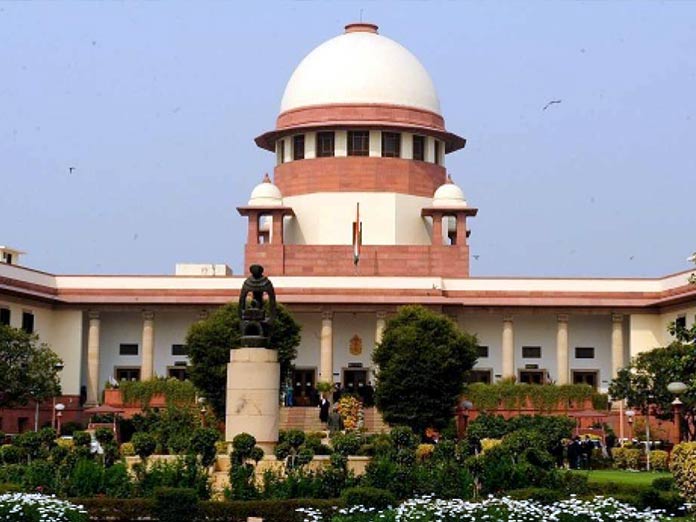Live
- MacBook Air M3 Hits Lowest Price in India: Find Details
- High Court Adjourns Hearing on Allu Arjun's Petition to 4 PM
- Pawan Kalyan praises Chandrababu Naidu at Swarnandhra Vision 2047 document launch
- Chirec International looks to transform education with Chirec 2.0 vision
- Telangana CM Revanth Reddy Responds to Allu Arjun's Arrest in Delhi
- Uddhav Thackeray to PM Modi: Pay attention to Bangladesh, act to end Hindus’ misery
- Allu Arjun Arrested: KTR Reacts on X, Calls Arrest Unfair
- Bold steps by Modi govt in reviving Indian heritage, culture: Union Minister
- What are the charges against Allu Arjun: Understanding the Charges Against Him
- Allu Arjun Objects to Arrest Procedure, Requests Breakfast and Change of Clothes
Just In

The Supreme Court Tuesday referred to a threejudge bench a plea challenging the Constitutional validity of provisions in matrimonial laws empowering courts to ask estranged spouses to cohabit and take part in sexual intercourse
The Supreme Court Tuesday referred to a three-judge bench a plea challenging the Constitutional validity of provisions in matrimonial laws empowering courts to ask estranged spouses to "cohabit" and "take part in sexual intercourse".
The plea said that these laws treat women as "chattel" and are violative of fundamental rights including the right to privacy.
Ojaswa Pathak and Mayank Gupta, the students of Gujarat National Law University at Gandhinagar, have challenged the validity of section 9 of the Hindu Marriage Act (HMA), Section 22 of the Special Marriage Act (SMA) and certain provisions of the Code of Civil Procedure (CPC). They empower courts to pass a decree of restitution of conjugal rights to an estranged couple.
"List the matter next week before a three-Judge bench," a bench comprising Chief Justice Ranjan Gopoi and Justice Sanjiv Khanna said after hearing brief arguments from senior advocate Sanjay Hegde, appearing for the students.
The plea referred to the nine-judge verdict that held privacy as one of the fundamental rights and assailed the legal provisions of the HMA and the SMA, saying that they force mostly unwilling women to cohabit with their estranged husbands.
"Courts in India have understood 'Conjugal rights' to have two key ingredients: cohabitation and sexual intercourse.
"Under the legal scheme in India, a spouse is entitled to a decree directing his other spouse to cohabit and take part in sexual intercourse. He or she is also entitled to coercive measures in the form of attachment of property in case the spouses wilfully disobeys the decree of restitution," the plea said.
The legal framework is "facially neutral" and places a "disproportionate burden on women", the plea said, adding that it is "based on feudal English law which regarded a woman as 'chattel' of his husband".
"The remedy of restitution of conjugal rights was not recognized by any of the personal law systems of India. The same has its origins in feudal English Law, which at that time considered a wife to be the chattel of the husband. The United Kingdom itself has abolished the remedy of restitution of conjugal rights in 1970," the plea said.
It is steeped in a patriarchal gender stereotype and is violative of Article 15(1) (prohibition of discrimination on the ground of gender etc) of the Constitution, it said.
The provisions were also violative of the rights to privacy, individual autonomy and dignity of individuals guaranteed under Article 21 (protection of life and personal liberty) of the Constitution, it said.
"The provisions for restitution of conjugal rights are facially neutral in as much as they allow both the husband and the wife to move court. However, in effect, they are deeply discriminatory towards women. The direct and inevitable effect of the provision has to be seen in light of the deeply unequal familial power structures that prevail within Indian society," said the petition.
Asserting that the right to cohabit was an intimate personal choice, the plea said that the provision requiring a person to cohabit with another against their will are violative of the Right to Privacy of an individual.
"The right to cohabit or take part in sexual intercourse with another is an intimate personal choice. These continue to exist in each individual - man or woman even after marriage. The scheme for restitution of conjugal rights is violative of the same in as much as it allows a man/woman to take coercive measures (in the form of attachment of property) against his/her spouse who is unwilling to have a conjugal relationship," the petition said.
The plea said that the validity of a law has to be tested according to the changing times.
"One of the objects for including Section 9 in the Hindu Marriage Act is that a wife can claim periodic payments from her husband who was unwilling to comply with a decree of conjugal rights and that this justification no longer holds good in light of the provision for maintenance under under Section 125 of the Code of Criminal Procedure," the plea said.
It also sought reconsideration of the 1984 apex court verdict by which it had set aside the Andhra Pradesh High Court's decision quashing section 9 of the Hindu Marriage Act.

© 2024 Hyderabad Media House Limited/The Hans India. All rights reserved. Powered by hocalwire.com







